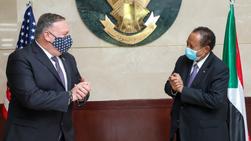 In this file handout picture provided by Sudan's Prime Ministers office on August 25, 2020, US Secretary of State Mike Pompeo (left) greets Sudanese Prime Minister Abdalla Hamdok (right) in Khartoum. The United States on December 14, 2020 formally removed Sudan's state sponsor of terrorism designation, 27 years after putting the country on its blacklist, the US embassy in Khartoum said. (HANDOUT / OFFICE OF sUDAN'S PRIME MINISTER / AFP)
In this file handout picture provided by Sudan's Prime Ministers office on August 25, 2020, US Secretary of State Mike Pompeo (left) greets Sudanese Prime Minister Abdalla Hamdok (right) in Khartoum. The United States on December 14, 2020 formally removed Sudan's state sponsor of terrorism designation, 27 years after putting the country on its blacklist, the US embassy in Khartoum said. (HANDOUT / OFFICE OF sUDAN'S PRIME MINISTER / AFP)
CAIRO / WASHINGTON - The United States on Monday reinstated Sudan’s sovereign immunity, as the US Congress passed legislation formalizing the move, following the ending of Sudan’s designation as a state sponsor of terror.
However, the legislation includes an exemption allowing lawsuits by the families of victims of the Sept 11, 2001, attacks on the United States already underway in US courts to move forward, although experts say Sudan is unlikely to lose those cases.
The state sponsor of terror designation, which was in place for almost three decades, had weighed on Sudan’s economy and restricted its ability to receive aid. For investors, the reinstating of sovereign immunity removes another layer of financial risk
The state sponsor of terror designation, which was in place for almost three decades, had weighed on Sudan’s economy and restricted its ability to receive aid. For investors, the reinstating of sovereign immunity removes another layer of financial risk.
Sudan had been engaged in talks with the United States for months, and paid a negotiated US$335 million settlement to victims of al-Qaeda attacks on US embassies in East Africa in 1998 who had been awarded much higher damages by US courts.
ALSO READ: Putin approves new Russian naval facility in Sudan
The process to release the settlement money and restore Sudan’s sovereign immunity - protection against being sued in American courts - had been stalled in the US Congress as it had been tied to the US$892 billion coronavirus aid package.
Late on Monday, the wider package was passed in the US Congress after a deal has been worked out in a rare weekend session, and sent to President Donald Trump to sign into law.
According to the bill, Washington will be authorizing US$111 million to pay off part of Sudan’s bilateral debt, and US$120 million to help pay off its debt to the International Monetary Fund (IMF) while making another $700 million available until September 2022 for assistance to the country.
Last week, Sudan’s finance minister announced a US “bridge loan” that would allow Sudan to clear US$1 billion in arrears to the World Bank.
ALSO READ: Israel 'to send first delegation to Sudan to firm up normalization’
A US source familiar with the matter said the debt assistance would help kick off Sudan’s debt relief on a global level, helping make it eligible for the IMF’s Highly Indebted Poor Countries (HIPC) program.
With the reinstatement of sovereign immunity and the financial aid, Khartoum will now be “on the hook,” to normalize ties with Israel, a US source familiar with the matter said, a move it has agreed to under US pressure.
In a joint statement in October, Israel and Sudan said they had agreed to normalize relations and end the state of belligerence between the two countries, but Sudan’s civilian leaders have said the final decision would be in the hands of a yet-to-be-formed transitional legislature.
The normalization would make Sudan one of the four Arab countries along with the United Arab Emirates, Bahrain and Morocco, over the past several months, to establish relations with Israel in deals brokered with US help.
ALSO READ: Agreement signed to restore Sudan's sovereign immunity
The bill also appropriates an additional US$150 million for Sudan’s settlement payment, in order to redistribute the funds in a way the bill’s sponsors say is more equitable.
The United States designated Sudan a state sponsor of terrorism in 1993 on the grounds that former President Omar al-Bashir’s regime was supporting militant groups including al-Qaeda, Hamas and Hezbollah.
In the 1990s, the regime became a pariah, hosting Osama bin Laden and positioning itself as a fulcrum for Islamist movements, although experts still say Sudan’s liability for the Sept 11 attacks is questionable.
READ MORE: US to remove Sudan from terror list after payment to victims


